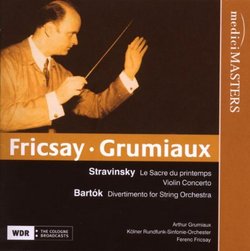| All Artists: Bela Bartok, Igor Stravinsky, Ferenc Fricsay, Cologne Radio Symphony Orchestra, Kölner Rundfunk-Sinfonie-Orchester Title: Stravinsky: Le Sacre du printemps; Violin Concerto; Bartók: Divertimento for String Orchestra Members Wishing: 0 Total Copies: 0 Label: Medici Masters Original Release Date: 1/1/2009 Re-Release Date: 8/25/2009 Genre: Classical Styles: Ballets & Dances, Ballets, Forms & Genres, Concertos, Symphonies Number of Discs: 1 SwapaCD Credits: 1 UPC: 827565027521 |
Search - Bela Bartok, Igor Stravinsky, Ferenc Fricsay :: Stravinsky: Le Sacre du printemps; Violin Concerto; Bartók: Divertimento for String Orchestra
 | Bela Bartok, Igor Stravinsky, Ferenc Fricsay Stravinsky: Le Sacre du printemps; Violin Concerto; Bartók: Divertimento for String Orchestra Genre: Classical |
Larger Image |
CD Details |
CD ReviewsFricsay meets Grumiaux Anton Zimmerling | Moscow, Russia | 03/17/2009 (5 out of 5 stars) "I am surprised that nobody reviewed this glorious CD yet - it adds some new items to the discography of the great conductor Ferenc Fricsay (1914-1963) and contains powerful readings of Bartók's and Stravinsky's scores - composers he championed throughout his career.
The series Medici Masters is devoted to outstanding performers of the past and offers reissues of their rare recordings and broadcasts. Fricsay is captured here not with his own orchestra - RIAS/RSO Berlin but with Rundfunk-Sinfonieorchester Köln (now WDR Cologne) where he was a guest conductor. Two of the three items found on this CD - Bartók's Divertimento and Stravinsky's `Le Sacre du printemps' were recorded by Fricsay in studio shortly after (1953), in both cases with RIAS. The third item - Stravinsky's violin concerto in D - was never recorded commercially by Fricsay, so this broadcast from Cologne (8 July, 1951) has double value keeping in mind the name of the soloist - Artur Grumiaux. Grumiaux is in excellent shape here and his touch in the beginning of the 1950-ies was just gorgeous. Fricsay has full command of the rhythm and style. I especially enjoyed the initial Toccata and Aria II. The final Capriccio is arresting too - both for the violin and the orchestral parts. It is a pity that he and Grumiaux did not record this concerto in studio, but their contracts prevented that: Fricsay had an exclusive contract with DG, while Grumiaux was a Philips artist. The two other items are jewels of the XX century music and music friends should be grateful for getting extra variants from a great conductor. Fricsay was likely preparing his studio recordings and experimenting with details. It is amazing to compare his commercial recordings made just a few months later with these intermediate variants and hear how maestro was adjusting to different mediums - RIAS and WDR Cologne. RIAS brass section was well-suited for modern music but high strings were probably better in Cologne by that time. As Bartók's Divertimento Sz.113 does not imply any other instruments except for strings, it is interesting to compare two Fricsay's variants of a score where the Cologne band potentially might have some advantage. To my mind, the first mvt. in the studio version (available on DG 437 675-2) is simply better. The beginning of the slow mvt., Molto adagio, is more appealing in the live Cologne version (the first violins!) but the overall conception of the studio version has greater force. The live version offers a dialogue of concertant violins and tutti a la concerto grosso, the crescendo in the central episode starting ca. [3'46] is rather subdued. In the studio Berlin version we hear weak screams of the first violins sounding frail over a really frightening sound wave in the bass (in the Berlin version, the crescendo starts ca. [3'56] and lasts till ca. [5'10]). The final mvt., Allegro assai, is enjoyable in both versions, though in a different way. In the studio version Fricsay strongly emphasizes the fugato, in the live Cologne version this skeleton is less visible and the movement sounds more dance-like. As for Stravinsky's Le Sacre du printemps, I would say that Fricsay's studio version (DG 477 5485 Igor Strawinsky: Le Sacre du Printemps) is a margin better, though the conductor's conception did not alter that much. The sound in these historic recordings ranges from `acceptible' to `good'. The transfers are excellent. Recommended for all lovers of great music and great conducting. A must for Fricsay collectors. " |
